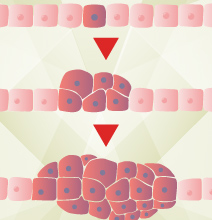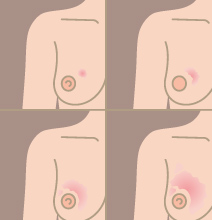Response to hormones
A high percentage of breast cancers respond to hormones (for those that do not respond see triple negative breast cancer

This means that their cells have receptors for hormones such as estrogen (in which case they are called ERpositive or ER+), or progesterone (in which case they are PR+). Cells with none of these two receptors are called hormone receptor-negative (or just hormone-negative).
Estrogen and progesterone are ordinary female sex hormones but in these cancers can be very dangerous. In breast cancers that are ER+ or PR+, when the hormone binds to its receptor the cancer cells are stimulated to divide growing the tumor.
However, these tumors respond well to treatments with anti-estrogen or anti-progesterone drugs that bind the hormone receptors, blocking the hormones from accessing them. Tamoxifen, for example, blocks estrogen receptors in cancer cells. Other types of drugs, such as aromatase inhibitors that can only be used in post-menopause women, interfere with the production of estrogen in the body.
Estrogen and progesterone are produced by the body, but can also come from an outside source, for example birth pills or hormonal treatments during menopause. These might need to be stopped in some cancers.
A tumor pathology report contains the results of several tests used to determine the tumor type.
Learn about triple negative breast cancer .





